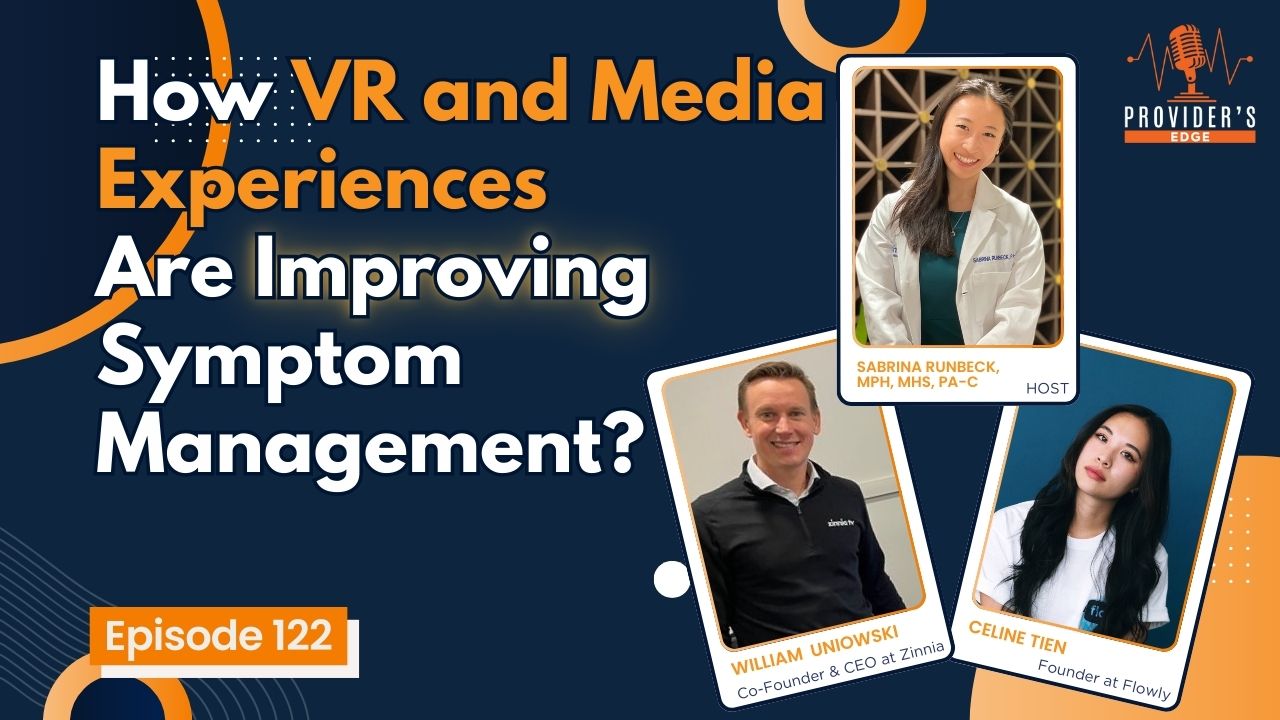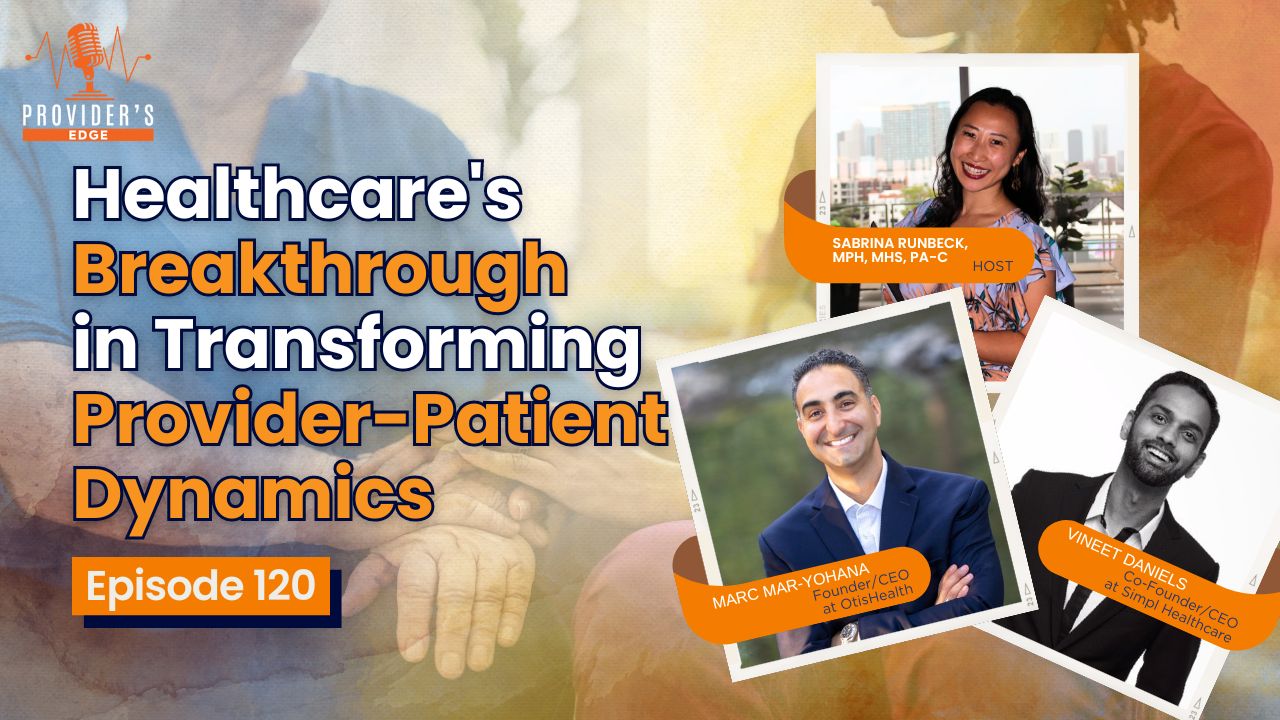
The Digital Painkiller:
What Every Healthcare Tech Founder Should Know
Did you know that chronic pain affects approximately 20% of adults worldwide? As healthcare tech founders, we're constantly seeking innovative solutions to improve patient care and outcomes.
Virtual reality (VR) technology is emerging as a promising tool in pain management, offering a non-pharmacological approach to addressing both physical and psychological aspects of pain.
Listen anywhere you get your podcastin' on.
Live Interview

The Rise of Virtual Reality in Pain Management
Pain transcends physical discomfort, often bringing anxiety, sleep issues, and isolation. Traditional management relies on medication, but holistic strategies are gaining recognition. VR technology offers a novel approach to address multiple aspects of pain simultaneously.
Immersive, calming virtual environments allow patients to engage in pain management while tackling psychological challenges. This comprehensive approach may reduce reliance on pharmaceuticals. VR can distract from pain, teach relaxation techniques, and provide virtual social interaction, combating isolation.
By integrating VR into pain management protocols, healthcare tech can offer a more personalized approach. This evolution in treatment strategies promises to improve patients' overall quality of life and well-being, marking a significant advancement in chronic pain care.
“Pain management and all the things that come with pain like anxiety, trouble sleeping, even feeling isolated, were all parts of the pain experience that I felt needed to be addressed." - said during an interview I had with @Celine Tien from “Flowy” during @HLTH
How VR Technology is Improving Patient Care
VR therapy for pain management goes beyond simple distraction. It combines immersive experiences with biofeedback technology to help patients learn to control their physiological responses to pain. Patients using VR therapy can engage in relaxing virtual scenarios while monitoring their heart rate and other vital signs.
This real-time feedback helps them learn to regulate their nervous system, shifting from a "fight or flight" response to a more relaxed state. The ability to self-regulate is a powerful tool for patients, giving them a sense of control over their pain and anxiety.
Key Benefits for Patients and Caregivers
VR therapy equips patients with self-regulation tools, allowing active participation in managing pain and anxiety. This empowerment can boost overall well-being and life quality. Patients gain a sense of control over their condition, reducing reliance on medication alone.
The benefits extend to caregivers as well. Caring for chronic pain patients is often emotionally and physically taxing. VR therapy offers caregivers a much-needed break, helping to reduce stress and prevent burnout. As patients' conditions improve through VR therapy, it indirectly lightens the load on caregivers.
This dual impact on both patients and caregivers makes VR therapy a valuable tool in comprehensive pain management strategies, potentially improving outcomes for all involved.
Integrating VR Solutions into Healthcare Tech
For healthcare tech founders, VR solutions offer new avenues in care models. Success hinges on collaboration with healthcare providers, many of whom are receptive to VR therapy as a complement to traditional treatments.
The potential extends across the healthcare ecosystem, with VR therapy showing promise in diverse fields like pain management, cardiology, and mental health. Partnerships with specialists in various areas can lead to more comprehensive and effective care solutions.
This cross-disciplinary approach allows for a broader application of VR technology, potentially improving patient outcomes across multiple medical specialties. By fostering these collaborations, healthcare tech founders can create integrated solutions that address a wide range of patient needs.
Overcoming Challenges in the Healthcare Tech Market
VR therapy shows promise, but faces hurdles. Reimbursement and coverage are key challenges, as many insurance plans don't include VR therapy, limiting patient access. Healthcare tech founders must advocate for coverage by demonstrating efficacy through robust research and highlighting potential cost reductions in overall healthcare.
Accessibility is another vital concern. Solutions need to be user-friendly for patients of all ages and tech abilities. Developing intuitive interfaces and providing adequate support can help bridge the technology gap.
By addressing these challenges, we can make VR therapy more widely available, potentially improving outcomes for a broader range of patients while reducing long-term healthcare costs.
The Future of Digital Pain Management
The applications of VR in healthcare extend far beyond chronic pain management. There's potential for its use in treating various conditions, from autoimmune disorders to mental health issues.
As we continue to innovate, we'll likely see increased integration of VR with other healthcare technologies. Imagine combining VR therapy with AI-powered personalization or integrating it with wearable health monitoring devices. The possibilities are vast, and as healthcare tech founders, we're at the forefront of this exciting frontier.
"So the magic wand would be every primary care physician, every neurologist, every doctor who's involved with diagnosing, detecting, and treating, Alzheimer's and other dementia, knows about [our solution], believes in [it], and recommends it to their patients." - @Bill Uniowski from “Zinniatv” said during an interview we had with him at the last ViVE summit hosted by @HLTH
Conclusion
VR therapy and digital health solutions are reshaping patient care, from pain management to dementia support. These technologies mark a shift towards holistic, patient-centered approaches.
For healthcare tech founders, the challenge lies in developing accessible solutions and integrating them into mainstream healthcare. The potential of digital health extends beyond current applications, promising exciting innovations.
Our focus must remain on improving patient outcomes and quality of life. These technologies aren't just innovative; they're transmuting, making real differences in people's lives. By merging advanced tech with deep patient understanding, we can create impactful healthcare solutions.
What's your experience with VR in healthcare? Have you encountered digital health solutions in your work or personal life? Share your thoughts below – let's discuss how we can advance patient care through technology.
Recommended Podcast Episodes
The healthcare industry faces a significant challenge: provider-patient interactions from scheduling to billing take 2-3 hours and involve 3-4 people.
The healthcare industry faces a significant challenge: provider-patient interactions from scheduling to billing take 2-3 hours and involve 3-4 people.
Are you still relying on traditional patient portals to manage health information? If so, you're missing out on a transformative shift in healthcare technology.
Be a guest on our show
The Provider's Edge show is always looking to feature healthcare change-makers and celebrate the work they are doing to improve healthcare.
Together, we can encourage other healthcare entrepreneurs and startup founders to up-level their businesses.
If you or someone you know could be a good fit as a guest on the show, please click on the bottom below to apply as a speaker.
Healthcare Entrepreneurs!
I can help you gain visibility and credibility in the right circles so you can accelerate your mission and profitability!
After overcoming burnout working in surgery, I went back to my roots in neuroscience and public health. I learned the importance of building key human relationships with my team throughout our organization.
While helping healthcare executives and entrepreneurs to get out of the day-to-day operation of their practice, I realized I needed more visibility and more connections to reach my ideal clients.
Once I set out to be highly visible in the right circles, I was able to leverage my network of strategic partners to convert clients 5x higher than any other marketing channel I had tried previously.
Now I help healthcare change-makers to accelerate their impact and increase profitability by gaining visibility and credibility with the right strategic partners.
My clients no longer worry about where their next client is coming from, the need to plan additional budget for ads spending, or losing the ability to connect with others because their social media account is shut down.
If you want to share your social mission with the world and gain pivotal supporters that become loyal clients... then you are in the right place, with the right consultant who is also a recovered clinician.




